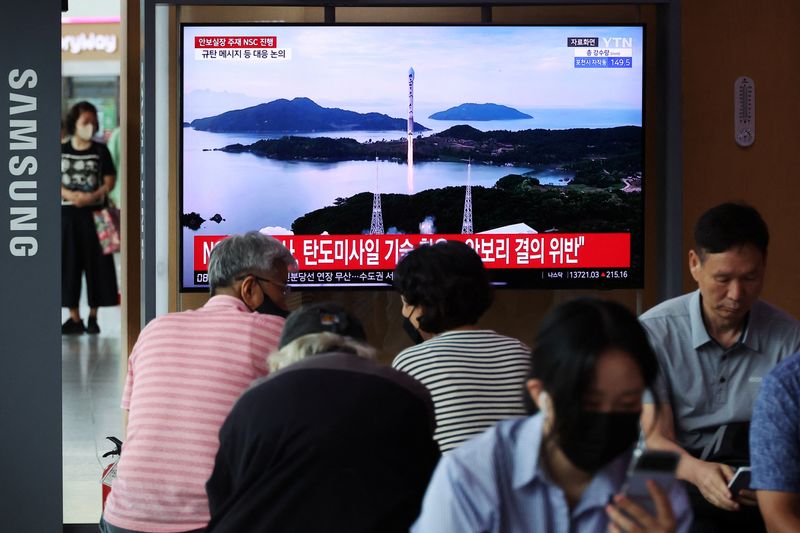North Korea says latest spy satellite launch failed, but will try again
Reuters
Published Aug 23, 2023 06:50PM ET
Updated Aug 24, 2023 04:26AM ET

By Josh Smith, Hyunsu Yim and Elaine Lies
SEOUL/TOKYO (Reuters) -North Korea's second attempt to place a spy satellite in orbit failed on Thursday after the rocket booster experienced a problem with its third stage, state media reported, as space authorities vowed to try again in October.
Its first try in May also ended in failure when the new Chollima-1 rocket crashed into the sea.
The pre-dawn launch came in the first hours of an eight-day window that North Korea had announced for the attempt.
The nuclear-armed country has been seeking to place what would be its first military spy satellite into orbit, saying it plans a fleet of satellites to monitor moves by U.S. and South Korean troops.
"The flights of the first and second stages of the rocket were normal, but the launch failed due to an error in the emergency blasting system during the third-stage flight," state news agency KCNA said of Thursday's launch.
South Korea's military said it tracked the flight from its launch at the North's Sohae Satellite Launching Ground and concluded that it was a failure. It said it was seeking to find and potentially salvage any wreckage.
The launch prompted an emergency warning in Japan just before 4 a.m. local time (1900 GMT) over the J-alert broadcasting system, telling residents of the southernmost prefecture of Okinawa to take cover.
About 20 minutes after the alert, the Japanese government followed up with a notice that the missile had passed and lifted the emergency warning.
In a televised news conference, Japanese Chief Cabinet Secretary Hirokazu Matsuno said the repeated missile launches were a threat to regional security.
"We will strongly protest against North Korea and condemn it in the strongest possible terms," he said.
Matsuno said parts of the rocket fell into the Yellow (OTC:YELLQ) Sea, the East China Sea, and the Pacific Ocean.
South Korea's National Security Council condemned the launch as a provocation and violation of U.N. Security Council resolutions banning the North's use of ballistic missile technology.
The White House condemned the launch as violating multiple U.N. Security Council resolutions, while the U.S. State Department urged North Korea to refrain from "further threatening activity" and calling on Pyongyang to engage in serious diplomacy.
"Space launch vehicles (SLVs) incorporate technologies that are identical to, and interchangeable with, those used in ballistic missiles, including intercontinental ballistic missiles (ICBMs)," a State Department spokesperson said in a statement.
MORE LAUNCHES TO COME
North Korea's National Aerospace Development Administration (NADA) said it would investigate and take steps to fix the cause of Thursday's failure but that it "is not a big issue" in terms of the rocket system's overall reliability.
"NADA expressed the stand that it would conduct the third reconnaissance satellite launch in October after thoroughly probing the reason and taking measures," KCNA reported.
The North's May 31 bid to launch the Chollima-1 satellite rocket ended with the booster and payload plunging into the sea after a failure in the second stage. State media blamed the setback on an unstable and unreliable new engine system and fuel.
South Korea recovered parts of that failed rocket, including the satellite payload, which it said did not appear to have military capability.
Despite the failure on Thursday, the state media report suggests that North Korea has made progress since May's crash, said Ankit Panda of the U.S.-based Carnegie Endowment for International Peace.
"There appear to still be time pressures for NADA to succeed given the commitment to an October follow-up launch," he added. "That may or may not provide enough time for North Korea's scientists to go back to the drawing board and iterate once again."
The secretive North considers its space and military rocket programs a sovereign right, and analysts say spy satellites are crucial to improving the effectiveness of its weapons.

North Korea has made multiple attempts to launch "earth observation" satellites, two of which appeared to have been successfully placed in orbit, including in 2016.
International observers have said the 2016 satellite seemed to be under control, but there was lingering debate over whether it had sent any transmissions.
Written By: Reuters
Trading in financial instruments and/or cryptocurrencies involves high risks including the risk of losing some, or all, of your investment amount, and may not be suitable for all investors. Prices of cryptocurrencies are extremely volatile and may be affected by external factors such as financial, regulatory or political events. Trading on margin increases the financial risks.
Before deciding to trade in financial instrument or cryptocurrencies you should be fully informed of the risks and costs associated with trading the financial markets, carefully consider your investment objectives, level of experience, and risk appetite, and seek professional advice where needed.
Fusion Media would like to remind you that the data contained in this website is not necessarily real-time nor accurate. The data and prices on the website are not necessarily provided by any market or exchange, but may be provided by market makers, and so prices may not be accurate and may differ from the actual price at any given market, meaning prices are indicative and not appropriate for trading purposes. Fusion Media and any provider of the data contained in this website will not accept liability for any loss or damage as a result of your trading, or your reliance on the information contained within this website.
It is prohibited to use, store, reproduce, display, modify, transmit or distribute the data contained in this website without the explicit prior written permission of Fusion Media and/or the data provider. All intellectual property rights are reserved by the providers and/or the exchange providing the data contained in this website.
Fusion Media may be compensated by the advertisers that appear on the website, based on your interaction with the advertisements or advertisers.